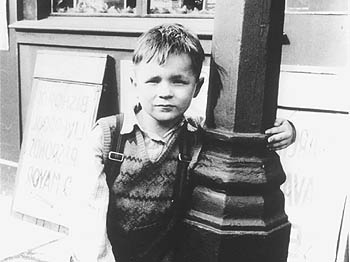![[Metroactive Movies]](/movies/gifs/movies468.gif)
[ Movies Index | Show Times | San Jose | Metroactive Central | Archives ]
 Trained for the faith: Anthony Burrows survives a hellfire education in 'Liam.' Porridge Power Stephen Frears' 'Liam' shows a fondness for the British working class By Richard von Busack AT THE RISK of seeming like an idiot, I'll confess fondness for the British working-class drama that goes beyond the better-known pleasures: the crisp theatrical discipline of the actors, the fragrant slang, the reminder of how bad other people have it (seeing other people eat cold porridge is supposed to make our own popcorn taste better). Here's where I'll really sound like an imbecile: the circumscribed lives look attractively simple compared to chaotic life in the United States. There's something soothing about the idea of a job you walk to and a pub that's exactly on the way home. The dole maybe disgusting, but a man is allowed to fall much harder and much lower in the United States. In the movies, the stability of polite, brown-brick, tea-drinking life comes across as quite appealing; the scarcity and dullness of it are usually obscured. Moreover, these films always address class struggle, an issue from which American movies back off in terror. (Even wan English slice-of-life films that settle on the motto "We'll all get by, somehow" resonate more like the life I know than the movies where people all drive Lexuses.) I watch these movies with the guilty feelings of an anthropologist studying a tribe, realizing I'm bringing my own longings for a sensible, peaceful life to bear on what I'm watching. Stephen Frears' new film, Liam, follows the woes of an unnamed row-housed working family in Liverpool in-between the Great War and the Good War. The film begins skating around a family preparing for a New Year's Eve that starts at a pub, then proceeds back home for a private party. These scenes are a pastiche of the elegiac style of Terence Davies in Distant Voices, Still Lives. As in Davies' film, the songs they sing reveal their backgrounds. Liverpool is a center for Irish immigrants and their children. Heated by drink, a guest starts singing the banned Irish revolutionary song "Dublin in the Green," and another guest tries to drown her out with a Loyalist anthem, showing us conflict to come. Also as in Davies, the father of this family is an unsteady figure. Dad (Ian Hart) works at the shipyards. About 10 minutes into Liam, the shipyards close because of the bad economy. As Dad stands by the gates, Mr. Samuels (David Knopov), the Jewish owner of the shipworks, stops the car to stare down the newly unemployed men. The focus changes to the smallest and quietest member of the family, 7-year-old Liam (Anthony Borrows), who is hobbled with a tremendous stutter. His First Communion is coming up, and he's being trained for the Catholic faith. Meanwhile, his sister, Teresa (Megan Burns), goes into domestic service for the Samuels family. Soon the film shows us the pincers the family is caught in. Dad, who feels exploited by bosses, pawnshop owners and rent collection, is swayed by the Black Shirts: English fascists. Meanwhile the church alternately preys on and poisons his family. Frears worked fast to get Liam together. Unfortunately, the result is derivative work. What starts as an exercise in the Davies manner turns into a more common Dickensenian tale, with the camera tilted into Carol Reed-style Dutch angles (used here, as in Reed's The Fallen Idol, to suggest a child's off-kilter view of the world). The Catholic faith here is presented at its most malign. The teachers practically blast the children with flame-throwers to frighten them with damnation to come. Jimmy McGovern, who wrote the film Priest, based Liam loosely on Joseph McKeown's book The Back Crack Boy. One should have brains enough not to dismiss any story of poor people as impossibly tragic. Still, Liam's point depends on a character standing in exactly the right spot for catastrophe. This dramatic engineering really made me think not of Dickens or Davies, but of Mark Twain: Twain's example of how a man, rather than a dog, has a better chance of being hit with a load of bricks. To be hit by a falling load of bricks has to be the result of divine providence, he argued, and you can't trust a dog to carry out divine providence. Besides, the dog would see the bricks coming, and move. Liam is best in the softer moments: the boy, untended for a minute, distracting himself by burying his feet in some gravel; a woman singing "Someone to Watch Over Me" a cappella in a pub. But coming out anti-fascist and anti-Catholic in 2001 isn't much of a risk, and these issues can't heat up a wispy film. Hart, a fixture in working-class film, is becoming a real specialist at making acting look like a duty. Since young Borrows doesn't destroy me with his cuteness, it seemed like Claire Hackett's was the performance to watch. Her Mum still has angry blood in her veins. Otherwise Liam makes the lives seem too still and the voices too distant.
Liam (R; 88 min.), directed by Stephen Frears, written by Jimmy McGovern, photographed by Andrew Dunn and starring Ian Hart and Anthony Borrows, opens Friday at Camera 3 in San Jose. [ San Jose | Metroactive Central | Archives ]
|
From the October 4-10, 2001 issue of Metro, Silicon Valley's Weekly Newspaper.
Copyright © 2001 Metro Publishing Inc. Metroactive is affiliated with the Boulevards Network.
For more information about the San Jose/Silicon Valley area, visit sanjose.com.